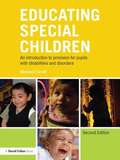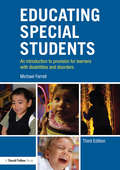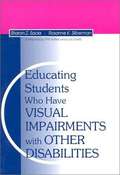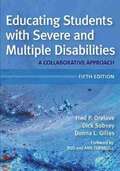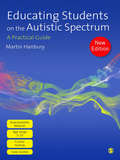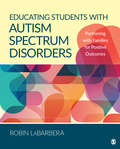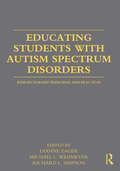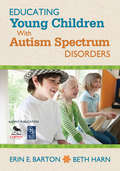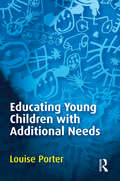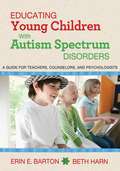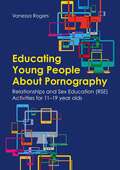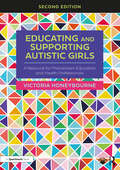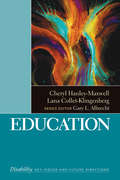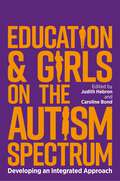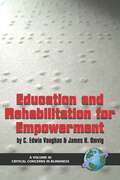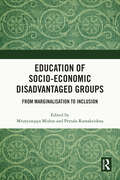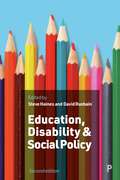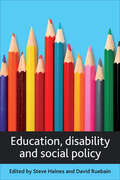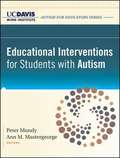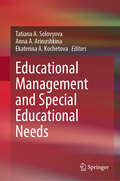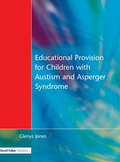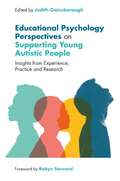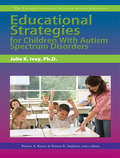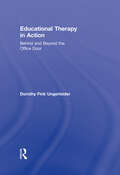- Table View
- List View
Educating Special Children: An introduction to provision for pupils with disabilities and disorders
by Michael FarrellEducating Special Children is the definitive guide to evidence-based practice and professionally informed approaches in provision for special children. Now in its second edition, this book outlines ideas of best practice that relate to various disabilities and disorders and helpfully discusses what might constitute effective provision. International in its scope, it explores issues surrounding: communication disorders and autism and Asperger's Syndrome developmental co-ordination disorders reading, writing and mathematics disorders disorders of conduct, anxiety and depression attention deficit hyperactivity disorder mild, moderate to severe, and profound cognitive impairment sensory impairments orthopaedic and motor disabilities, health impairments and traumatic brain injury. This new edition has also been updated to cover: entitlement to special education global examples of distinctive provision raising standards in your setting basic brain anatomy and physiology 'thinking points' and further reading list for reflection. Educating Special Children will be of interest to all students of special education, professionals and others interested in gaining an understanding in the challenging field of offering provision for special children.
Educating Special Students: An introduction to provision for learners with disabilities and disorders
by Michael FarrellEducating Special Students is the definitive guide to evidence based practice and professionally informed approaches to provision for special students. Now in its third edition, the book sets out ideas of best practice relating to different disabilities and disorders, helpfully discussing what might constitute effective provision. This edition has been updated to take account of new ways of classifying disabilities and disorders, and recent developments in research and practice, including the 2014 SEND Code of Practice (England) and the Diagnostic and Statistical Manual of Mental Disorders Fifth Edition DSM-5TM. A new appendix provides information on basic anatomy and physiology. International in scope, the book explores issues relating to: intellectual disability (profound, moderate to severe, and mild) sensory impairments orthopaedic impairment and motor disorders, health impairments, and traumatic brain injury oppositional defiant disorder, conduct disorder, anxiety disorders, depressive disorders, and attention deficit hyperactivity disorder communication disorders (speech, grammar and comprehension, semantics and pragmatics), and autism spectrum disorder specific learning disorders with impairment in reading, written expression and mathematics, and developmental co-ordination disorder. Educating Special Students will be of interest to all those studying special education, professionals, and others committed to seeking the best provision for special students.
Educating Students Who Have Visual Impairments With Other Disabilities
by Sharon Sacks Rosanne K. SilbermanWith a concentration on education needs, learning styles, and recommended classroom practices, this introductory text demonstrates functional assessment and teaching adaptations that improve inclusive learning experiences for students with a wide range of visual impairments and multiple disabilities.
Educating Students With Severe And Multiple Disabilities: A Collaborative Approach
by Dick Sobsey Fred P. Orelove Donna GillesA cornerstone of special education training for 30 years, this is the definitive textbook for preparing educators, counselors, and other related services professionals to teach children with severe and multiple disabilities in inclusive settings. Now in a revised, thoroughly updated, and streamlined fifth edition, this bestselling volume gives current and future educators the research and practical strategies they need to ensure the best learning outcomes for their students. Presenting a team-based, collaborative approach to education, this comprehensive text includes valuable contributions from respected experts in diverse fields, including fresh voices in special education, physical therapy, occupational therapy, communication, counseling, and pediatrics. Equally useful for preservice professionals and practicing educators in inclusive classrooms, this highly regarded textbook will fully prepare professionals to meet the educational, emotional, and health care needs of students with severe and multiple disabilities.
Educating Students on the Autistic Spectrum: A Practical Guide
by Dr Martin HanburyThe aim of this book is to make sure all students on the Autistic Spectrum are given the opportunity to engage in appropriate teaching and learning experiences. It considers the individual with autism, and offers tried and tested approaches that have worked, giving background information on autism and its impact on the learner. In this new edition, the author has added: - more information on sensory issues - an increasingly holistic view of the student with autism - new ideas for curriculum planning in mainstream settings - advice on multi-professional working - guidance on developing positive working relationships with parents and carers There is a wealth of new electronic material available to download from the SAGE website, including photocopiable materials, PowerPoint presentations and checklists. A must-have resource for all practitioners working with children and young people on the autistic spectrum, this book will improve your inclusive practice and ensure positive outcomes for these children.
Educating Students with Autism Spectrum Disorders: Partnering with Families for Positive Outcomes
by Robin L. LaBarberaEducating Students with Autism Spectrum Disorders: Partnering with Families for Positive Outcomes focuses on practical strategies for educating children with autism spectrum disorders in the classroom. Additional features describe how to partner with families in the implementation of many of the strategies, giving voice to parents, based on recent quantitative and qualitative research. Case studies developed from real interviews with parents and educators open each chapter, and the book focuses on what "works" and what "does not work" in their collaborative experiences.
Educating Students with Autism Spectrum Disorders: Partnering with Families for Positive Outcomes
by Robin L. LaBarberaEducating Students with Autism Spectrum Disorders: Partnering with Families for Positive Outcomes focuses on practical strategies for educating children with autism spectrum disorders in the classroom. Additional features describe how to partner with families in the implementation of many of the strategies, giving voice to parents, based on recent quantitative and qualitative research. Case studies developed from real interviews with parents and educators open each chapter, and the book focuses on what "works" and what "does not work" in their collaborative experiences.
Educating Students with Autism Spectrum Disorders: Research-Based Principles and Practices
by Michael L. Wehmeyer Richard L. Simpson Dianne ZagerSimilar to a handbook in its comprehensive description of the theory and research supporting current practices in the treatment of autism spectrum disorders, this interdisciplinary text shows how the existing knowledge base can be used to explore promising new possibilities related to the field’s many unanswered questions. Key features include the following: Comprehensive – This is the first book to consider the history and current state of autism as a field in transition, to cover its varied approaches and philosophies, and to describe the interventions used throughout the developmental cycle. Cross Disciplinary – Serving students with autism necessitates communication and collaboration among professionals from several disciplines as well as family members. The editors have, therefore, brought together divergent perspectives, theories and philosophies in order to demonstrate that scientific evidence, rather than educational orientation, must determine which practices should be selected for use in particular situations. Research Based – Whereas many existing texts advocate a particular type of treatment, this one recognizes that interventions must be selected and evaluated based on the scientific evidence of their effectiveness. Integrated Methodology –Chapter authors consider findings from studies that employed single-subject designs, experimental large-scale studies, and qualitative methodology. The inter-relatedness of therapies and disciplines will be highlighted throughout. Expertise – The volume editors are all highly visible researchers in autism and developmental disabilities. Likewise, each chapter is directed by a senior, highly accomplished author who is nationally recognized for his/her work in the topic being addressed. This book is appropriate for practicing professionals in education and psychology and for speech/language therapists and other clinicians. It is also suitable as a graduate level text in these fields.
Educating Young Children With Autism Spectrum Disorders
by Beth Harn Erin E. BartonEverything you need to know to educate students with autism Every 20 minutes, another child is diagnosed with autism. Are you ready to meet this growing educational challenge? This authoritative guide is for practitioners - early interventionists, teachers, school counselors, psychologists - who are committed to the education and dignity of students with autism in preschool and elementary grades. Each chapter focuses on a critical issue and offers solutions, including: Improving communication, social, generalization and self-management skills Designing instruction, intervention, and assessment Including families in developing goals and interventions Using students’ special interests to deliver instruction Understanding and preventing challenging behavior Evaluating practices to promote successful outcomes for students, families and practitioners
Educating Young Children with Additional Needs
by Louise PorterIn scope and spread this book deserves to become a standard text for policy-makers, practitioners, those in training and their tutors. I welcome this book for its coverage of typical and a-typical development in young children and its emphasis upon an ethical and principled approach to working with young children and their families.Professor Sheila Wolfendale, Director of the Doctorate in Educational Psychology programme at the University of East London.Most young children with additional educational needs are enrolled in their local childcare centre or pre-school. Whether they have delayed or advanced skills, many will need extra support from teachers and child care workers so that they can participate fully in these settings.Educating Young Children with Additional Needs is a comprehensive guide to working with these children. It outlines how to recognise when young children have atypical needs, individualise relevant programs for them, and make sure that they can participate socially with other children in the group. It highlights the importance of teachers' and caregivers' responsiveness both to the children and their parents. Individual chapters explain how to identify and meet the additional needs of children with vision or hearing impairments and those with difficulties acquiring motor, daily living, communication or intellectual skills. The emphasis is on assisting those with mild to moderate difficulties in any of these domains. The particular needs of gifted children are also explored. Educating Young Children with Additional Needs is a valuable professional reference and student text for child care workers and pre-school teachers.
Educating Young Children with Autism Spectrum Disorders: A Guide for Teachers, Counselors, and Psychologists
by Beth Harn Erin E. BartonAccording to the CDC, one in fifty American children is diagnosed as having an autism spectrum disorder. This means more school-aged children are entering classrooms with ASDs and teachers are being called upon to help facilitate their learning. Educating Young Children with Autism Spectrum Disorders is aimed at providing strategies for teachers, school counselors, and psychologists to help address the needs of children on the spectrum, as well as their families. Erin E. Barton and Beth Harn draw on current research and practices to discuss the possible causes of autism and to help prepare educators not only for teaching children in the classroom but also for providing families with the tools necessary to continue the educational process at home. Included are topics such as: Improving communication and socializationDeveloping instructive lessonsAssessing students' progressIncluding families in educational goalsFinding students' special interests and using those to help facilitate learningManaging challenging behaviorAnd more Including forms, charts, and a range of classroom activities, this is the only resource you will need to gain the insight and tools for making a difference in the educational lives of young children with autism.
Educating Young People About Pornography: Relationships and Sex Education (RSE) Activities for 11-19 year olds
by Vanessa RogersAt a time when pornography is more accessible than ever and many young people are inadvisably turning to pornography to learn about sex and relationships, this book explores what pornography is, the politics behind pornography, how it can affect both sexual and non-sexual relationships and the effects of pornography on mental health. The book also covers the important wider topics of the making and sharing of inappropriate images and over exposure to porn contributing to what is becoming known as 'rape culture'. It includes full lesson plans, activities, photocopiable materials and clear information on how to implement the programme, including outlines for staff CPD sessions and parent workshops.This book will be vital for PSHE teachers, senior leadership teams, pastoral care teams, school counsellors, youth workers, school nurses, and anyone who might be involved in sex education provision for young people.
Educating and Supporting Autistic Girls: A Resource for Mainstream Education and Health Professionals
by Victoria HoneybourneAutistic girls, especially those educated in mainstream environments, have often been missed or misdiagnosed. There is now, however, greater awareness of how autism can present in females, why these girls can remain ‘invisible’, and what education and health professionals can do to provide better support. Fully revised and updated, this practical book shines a light on the insights, opinions and experiences of autistic girls and women, providing a rich insight into school life from an autistic perspective. It explores the difficulties and disadvantages that autistic girls can face in educational settings and offers guidance on how to best support them, with a wealth of strategies reflecting good practice in the field of autism and education. The resource also contains a broad range of worksheets and activities on key issues and includes new sections on anxiety, masking, home life, social media, gender and sexual identity. Key features include: A wealth of case studies to illustrate different topics Guidance on best practice when working with autistic girls New audits to help staff and pupils to identify strengths and areas to improve Easy-to-implement strategies and tips to help professionals adapt to environments and policies for autistic students Activities and resources for young autistic females to support them in developing self-awareness, coping strategies and learning skills With the voices of autistic girls and young women woven throughout, drawing upon their experiences of education – from learning and communication, to friendships, transitions and interpreting the world – this is an essential resource for education and health professionals working with autistic girls, particularly in mainstream environments.
Education
by Cheryl Hanley-Maxwell Lana Collet-KlingenbergThis volume in The SAGE Reference Series on Disability explores education issues for people with disabilities and is one of eight volumes in the cross-disciplinary and issues-based series, which examines topics central to the lives of individuals with disabilities and their families. With a balance of history, theory, research, and application, specialists set out the findings and implications of research and practice for others whose current or future work involves the care and/or study of those with disabilities, as well as for the disabled themselves. The concise, engaging presentational style emphasizes accessibility. Taken individually, each volume sets out the fundamentals of the topic it addresses, accompanied by compiled data and statistics, recommended further readings, a guide to organizations and associations, and other annotated resources, thus providing the ideal introductory platform and gateway for further study. Taken together, the series represents both a survey of major disability issues and a guide to new directions and trends and contemporary resources in the field as a whole.
Education and Girls on the Autism Spectrum: Developing an Integrated Approach
by Christopher Gillberg Judy Eaton Alexandra Sturrock Siobhan O'Hagan Sarah Wild Gareth D. Morewood Carla Tomlinson Elizabeth Critchley Sarah-Jane Critchley Rachael SalterAddressing the gender gap in the understanding of autism, this multi-perspective book explores the educational needs of girls on the autism spectrum from early years to secondary school, in both mainstream and special settings. The collection, comprising insights from autistic women and girls and educational and medical professionals makes recommendations for a collaborative and integrated approach that enables girls on the spectrum to reach their full potential. By establishing close collaborations between girls on the spectrum, their parents, teachers and specialist professionals, the field can move forwards in terms of providing understanding and an appropriate educational framework for success.
Education and Rehabilitation for Empowerment
by James H. Omvig C. Edwin VaughanThis work is an examination of educational issues and policies impacting on the blind. Topics include Braille literacy, the teaching of orientation and mobility, adult rehabilitation programmes and policies, and the role of state and federal government in the education and rehabilitation process.
Education of Socio-Economic Disadvantaged Groups: From Marginalisation to Inclusion
by Mrutyunjaya Mishra Pettala RamakrishnaThis book explores policy measures and social programmes designed to make quality education accessible to socio-economic disadvantaged groups (SEDGs) in India. It discusses the status of education of disadvantaged or marginalized groups, the discourse around education and equity in India and innovative practices undertaken by both government and non-government institutions to increase accessibility to education. The book highlights the disparity in the quality of education available to disadvantages groups, including religious, ethnic and caste minorities, women and girls, transgender people, people with disabilities and migrant or displaced children. It examines the effectiveness of initiatives and policies which have been implemented to bring quality education to the SEDG in India. It also offers suggestions and policy recommendations to bridge the disparity in education which will consequently lead to greater economic and social mobility, inclusion and socio-economic development. The book will be of interest to teachers, students and researchers of education, sociology, development studies, social work, and disability studies. It will also be useful for policymakers, academicians, and professionals working in the field of education, social work, and rehabilitation.
Education, Disability and Social Policy
by Steve Haines and David RuebainEducational opportunities for disabled children remain a vital contemporary issue in British social policy. This new edition of the milestone book Education, Disability and Social Policy outlines critical debates in education concerning the position and experiences of disabled children and young people within a contemporary policy context. Incorporating new voices from leading thinkers, this second edition includes a fresh introduction and updates to key chapters, including whether the Children and Families Act (2014) resolved tensions between parents and local authorities over resources, and proposals for a whole-school, strengths-based approach to social, emotional and mental health difficulties. In addition, it includes a new discussion on the intersection of race and disability.
Education, disability and social policy
by David Ruebain and Steve HainesDisability is an increasingly vital contemporary issue in British social policy especially in education. Education, disability and social policy brings together for the first time unique perspectives from leading thinkers including senior academics, opinion formers, policy makers and school leaders. Key issues covered include: law and international human rights frameworks; policy developments for schools and school leaders; educational inequalities for disabled children and young people and curriculum design and qualifications changes for children who are being failed by the current education system. The book is a milestone in social policy studies, of enduring interest to students, academics, policy makers, parents and campaigners alike.
Educational Interventions for Students with Autism
by Peter Mundy Ann M. MastergeorgeEducational Interventions for Students with Autism offers educators a vital resource for understanding and working with autistic students. Written by nationally acclaimed experts in the field and published in collaboration with the world-renowned UC Davis M. I. N. D. Institute, the book aims to deepen educators' appreciation of the challenges surrounding autism in a classroom setting and the current best practices in education for autism. To best meet the practical needs of teachers, school administrators, and parents, the book includes integrative summaries throughout, with recommendations for real-world classroom use. Topics covered include: how autism affects student learning, autism and its impact on schools, a teacher's view of autism and the classroom, best practices and challenges of working with students with ASD in the classroom,working with high-functioning autism (HFA) in schools, successful community-school partnerships, options for teacher training, and more.
Educational Management and Special Educational Needs
by Anna A. Arinushkina Tatiana A. Solovyova Ekaterina A. KochetovaThis book systematizes the latest findings on the clinical, psychological, and pedagogical features of today’s children with special educational needs (SEN) and expands the scientific understanding that characterizes such children. The book develops a system of education and assistance for children with SEN, including children with locomotor disabilities, intellectual disabilities, autism spectrum disorders, and hearing and visual impairments. The book is intended for heads of educational authorities, parents, specialists working with children with special educational needs, psychologists, teachers, methodologists, specialists in the field of inclusive education, and students and teachers in special education of pedagogical and psychological departments of higher education institutions.
Educational Provision for Children with Autism and Asperger Syndrome: Meeting Their Needs
by Glenys JonesThe range of educational options available to a child with Autism and Asperger syndrome is broad, but choosing the right path can often be a complex task for all involved. This book provides information and advice for professionals and parents making crucial decisions about meeting the needs of children with autistic spectrum disorder. It covers the range of intellectual ability from those having severe learning difficulties to those of above average intelligence. Practical advice for those working with children from preschool to post-16 is given on: choosing the most appropriate educational placement; making decisions on which educational interventions to follow; creating an effective educational environment; working with staff and other children to maximum effect; writing effective individual education plans; working with parents and families; enabling a smooth transition between classes and stages of education; and life beyond school.
Educational Psychology Perspectives on Supporting Young Autistic People: Insights from Experience, Practice and Research
by Clare Hughes Carol Povey Phil Christie Luke Beardon Alexandra Lewis Sue Fletcher-Watson Prithvi Perepa Liz Pellicano Nicola Yuill Laura Cockburn Dr Laura Crane Vicky Slonims Jennifer Baulcomb Carrie Grant Scot Greathead Rhiannon Yates Bola Abimbola Diana Loffler Annie Etherington Irina Roncaglia Charlotte Hatton Jane Park Katie Maras Adam O'Loughlin Juliet Gittens Lynne Moxon Ken Greaves Alyssa Alcorn Owen Rhys BarryAn essential guide for any professionals working with autistic children and young adults, this book provides expert insights which need to be considered by professionals, parents and autistic people alike. It covers key themes such as anxiety and wellbeing, transition into adulthood, sexuality, intersectionality, and many more.A unique blend of first-hand experience, parental guidance and professional advice is provided from prominent figures in the autism field to offer you an overview of the important issues of today, to help you understand and better support autistic young people.
Educational Strategies for Children With Autism Spectrum Disorders
by Julie K. IveyFocusing on educational and instructional strategies that are successful with students with autism spectrum disorders, Educational Strategies for Children With Autism Spectrum Disorders profiles the most current, research-based interventions that can be implemented by teachers in a classroom setting. Because autism spectrum disorders are on a continuum, educational placements can range from specialized autism classrooms to full-time inclusion in a general education classroom. It is important for teachers and staff to understand the various educational strategies that are available. It is the goal of this book to provide interventions and strategies to help teachers and staff best serve students on the autism spectrum. Strategies include applied behavior analysis, the Developmental, Individual Difference, Relationship-Based (DIR) model, discrete trial training, Picture Exchange Communication System (PECS), Pivotal Response Treatment (PRT), Sensory Integration Therapy, and Social Stories, among others.
Educational Therapy in Action: Behind and Beyond the Office Door
by Dorothy Fink UngerleiderThis book provides an in-depth look at what a little-known clinician, the educational therapist, does and how they do it. It goes behind the clinician’s door to illustrate the unusual and broad range of interventions – both academic/vocational and social/emotional – that an educational therapist employs. This particular case study involves a young woman named Nora who had a severe but undiagnosed auditory processing disorder. She could not give meaning to the spoken language that came at her too rapidly, leaving her in a constant fog of words that she couldn’t comprehend. This case discloses the problems, their causes, and the emotional toll that had to be considered when developing an effective educational/therapeutic plan for Nora. It vividly illustrates the dynamic exchanges and mutual learning that goes on between client and therapist. Parts I and II illustrate how the psycho-educational interventions that addressed Nora’s academic and non-academic needs were gradually formulated over the first year. Part III provides a series of vignettes from subsequent years that illustrate the ongoing applications of the therapist’s work. Distinguishing Features Explanatory Sidebars – The rationale behind particular techniques and interventions is clarified through a system of explanatory sidebars that inform the reader without distracting from the story. This approach makes the book both an instructional tool well as compelling story. Organic Curriculum – The rationale for and application of an "organic (personalized) curriculum" is explained and applied throughout the book as a model for others to use in working with this population. A Longitudinal Perspective – The initial work with Nora began many years ago, so this book provides a long view of her life and tracks the influences that educational therapy exerted on her development into a fully functioning adult. Cognitive/Emotional Integration – The core of educational therapy – the interdependence of cognitive skills and emotional response – is clearly documented throughout the book. In addition to educational therapy students and practitioners, this book is appropriate for those working in related fields such as special education, school psychology, school counselling, and social work in educational settings.
